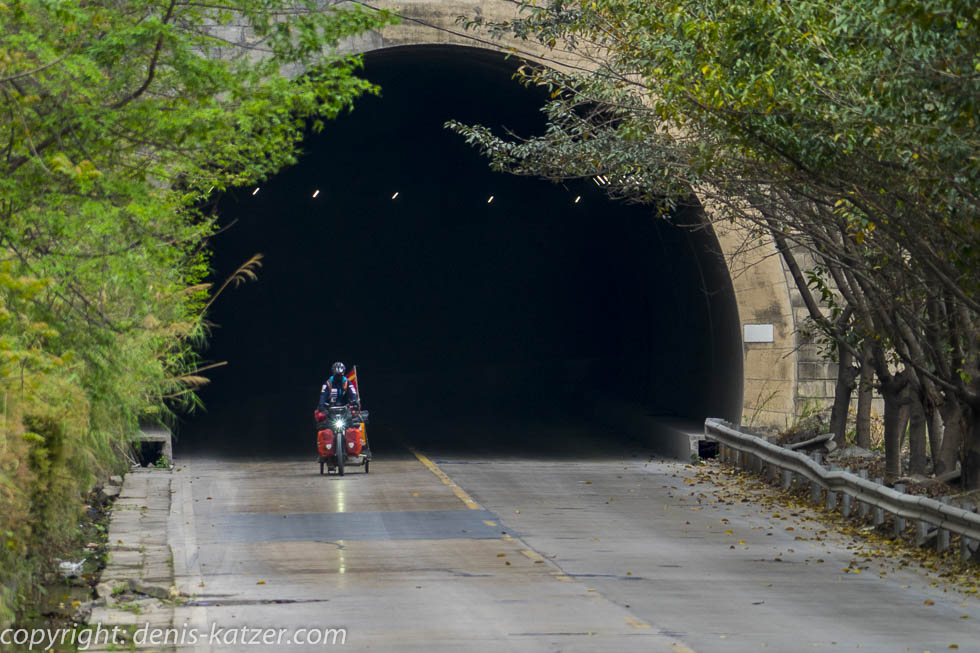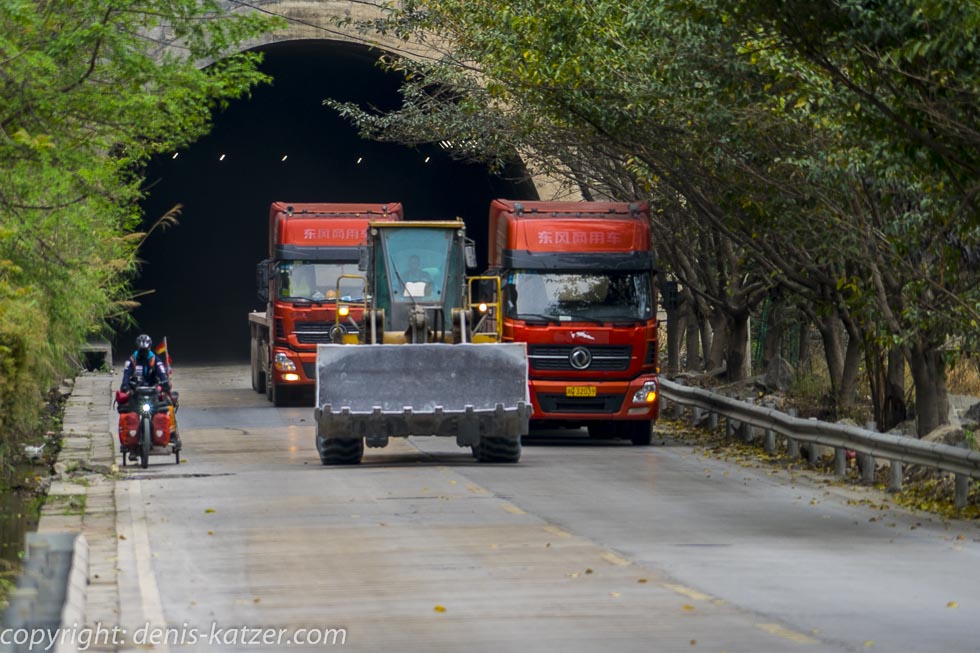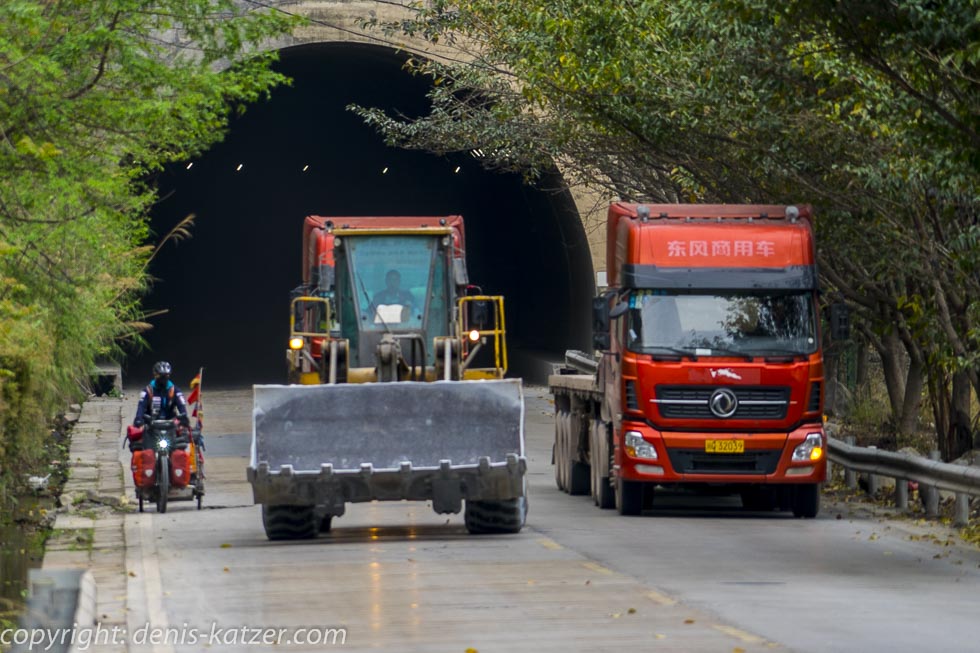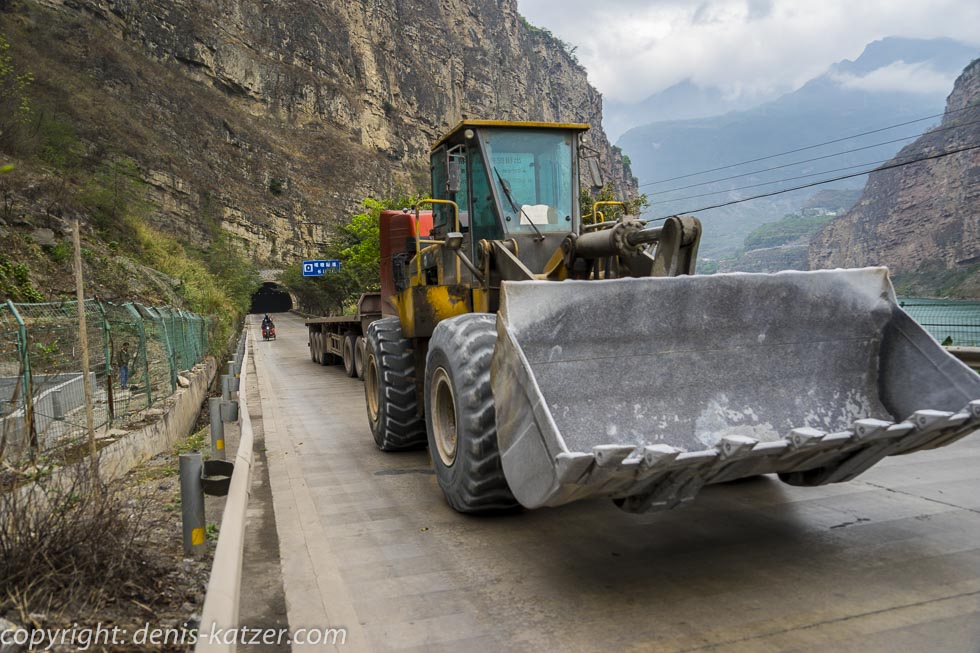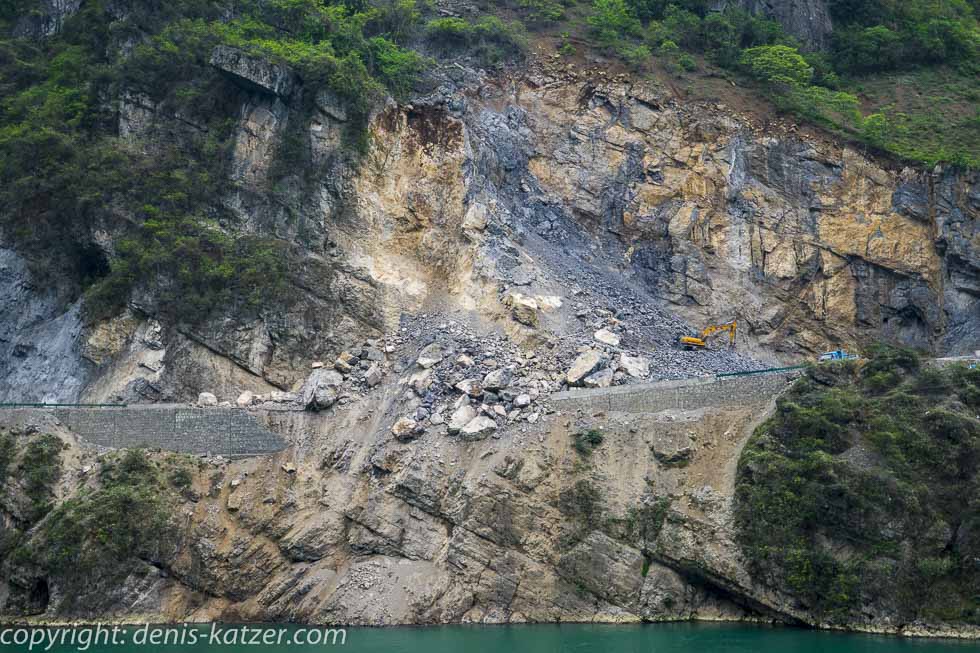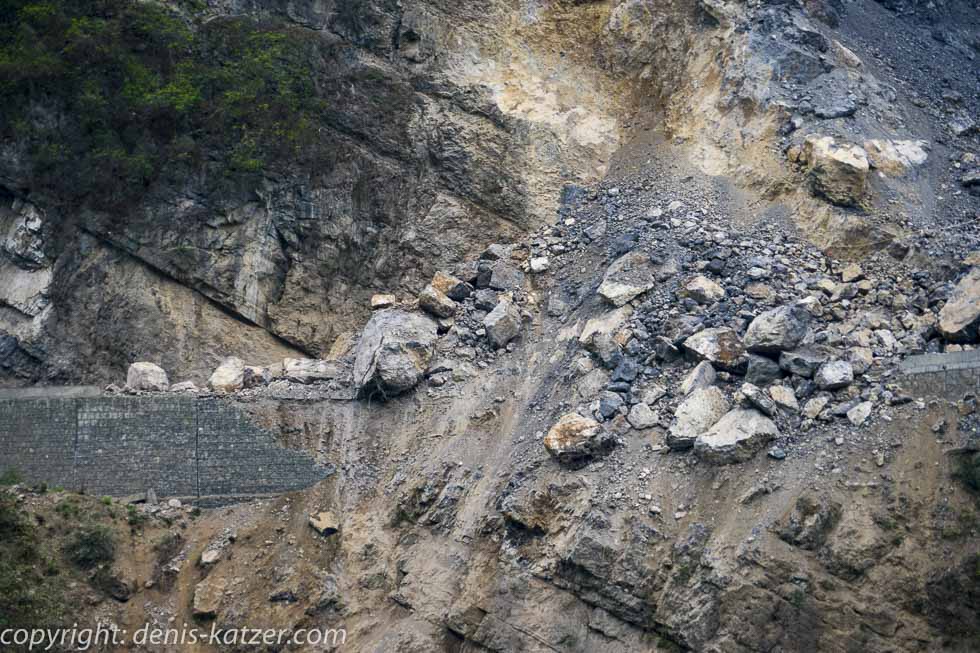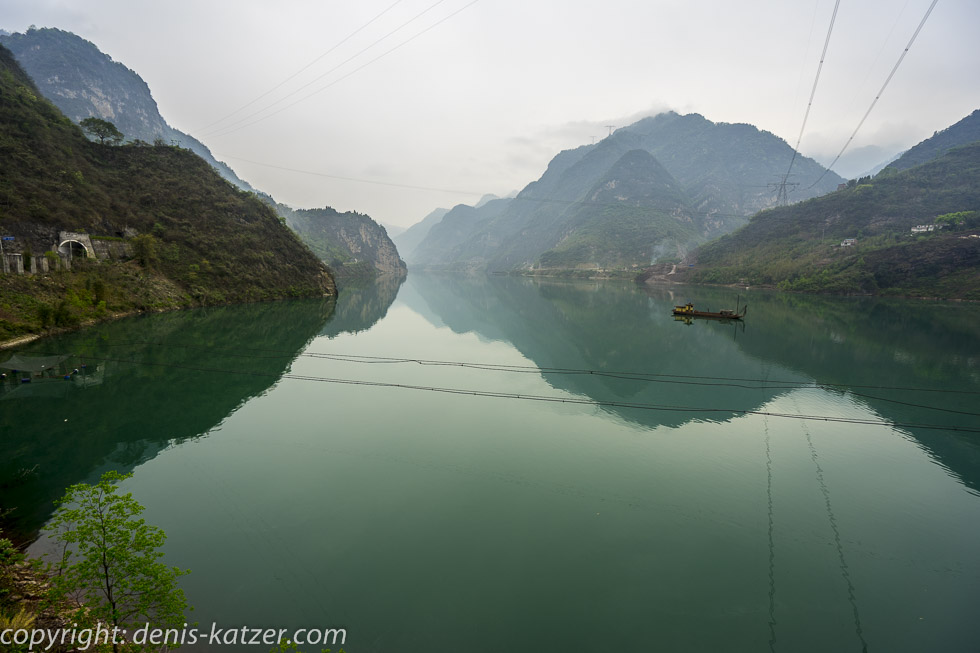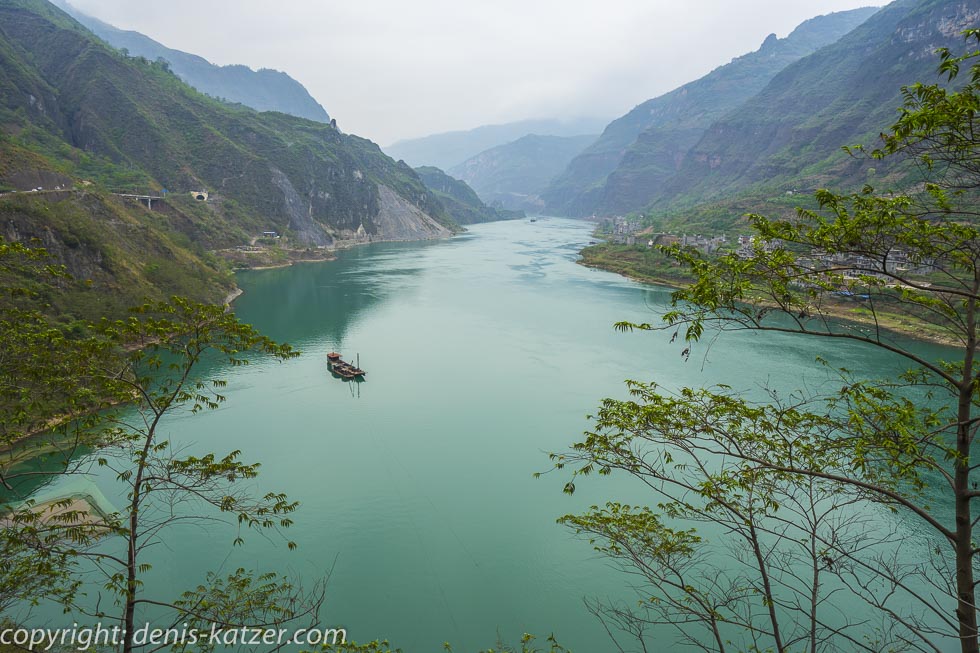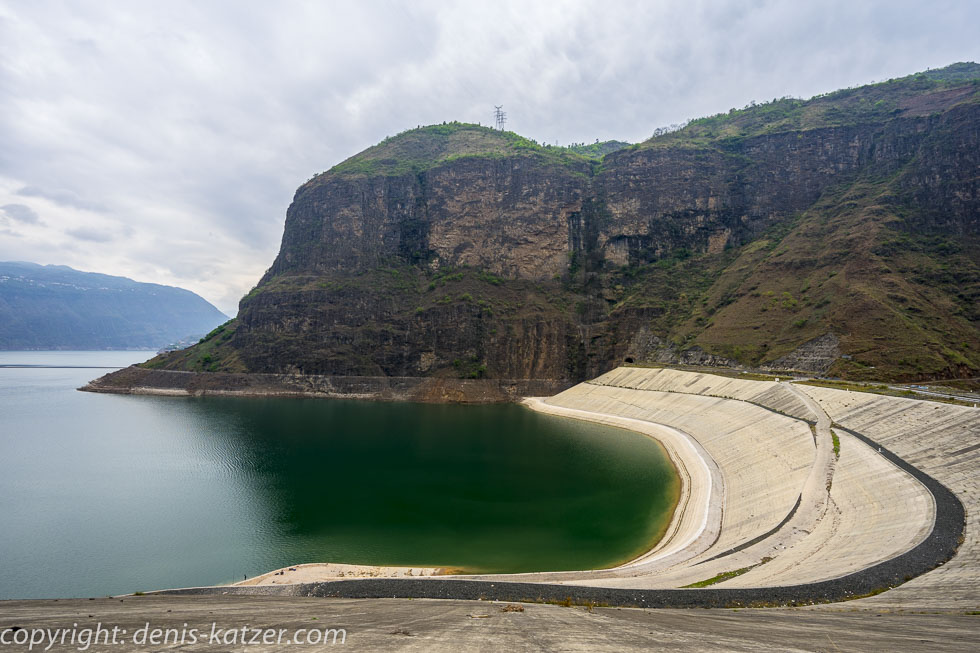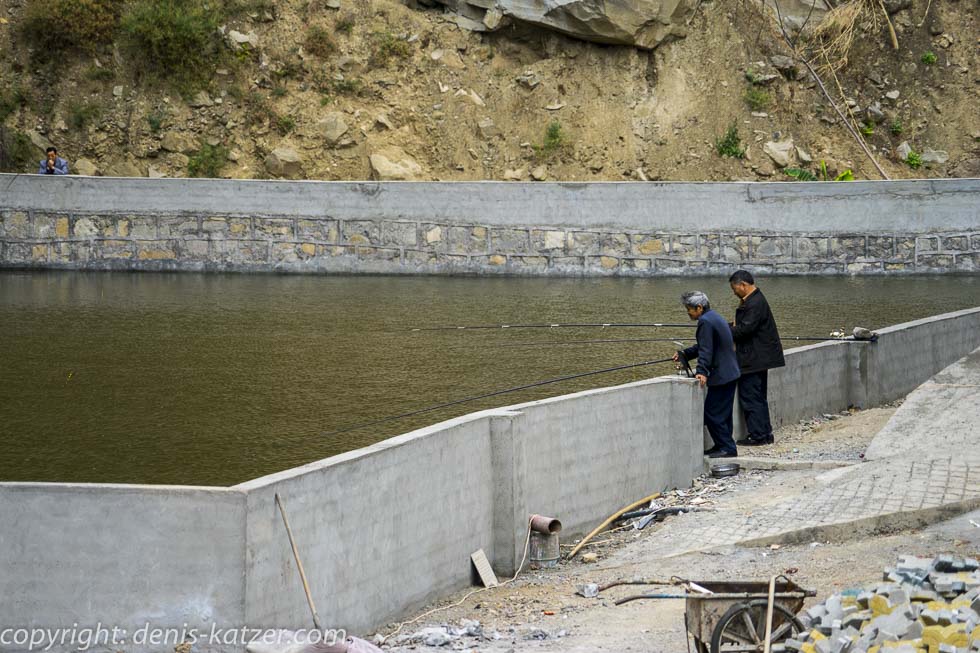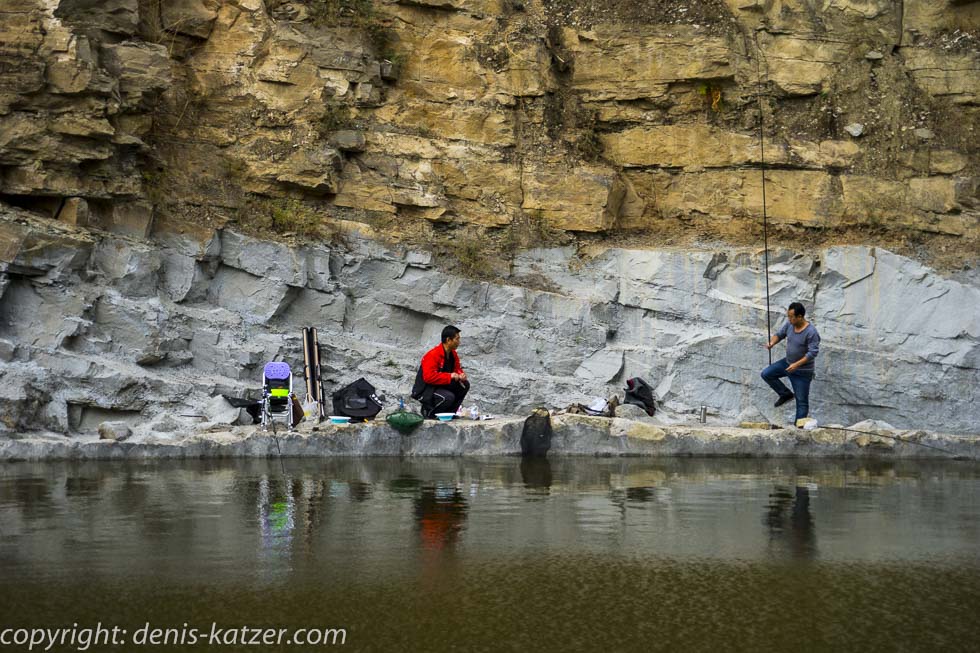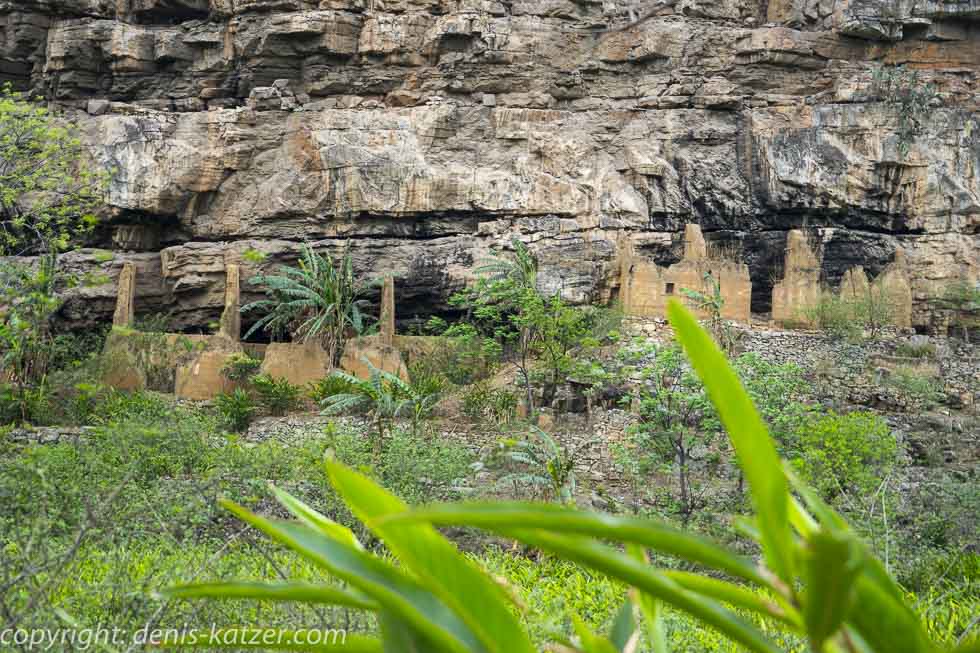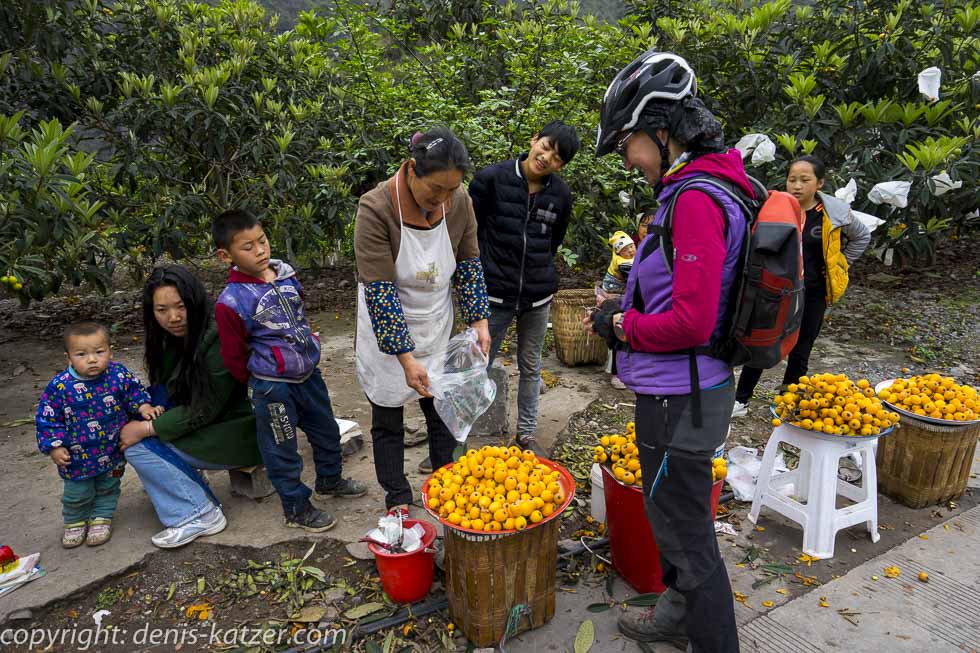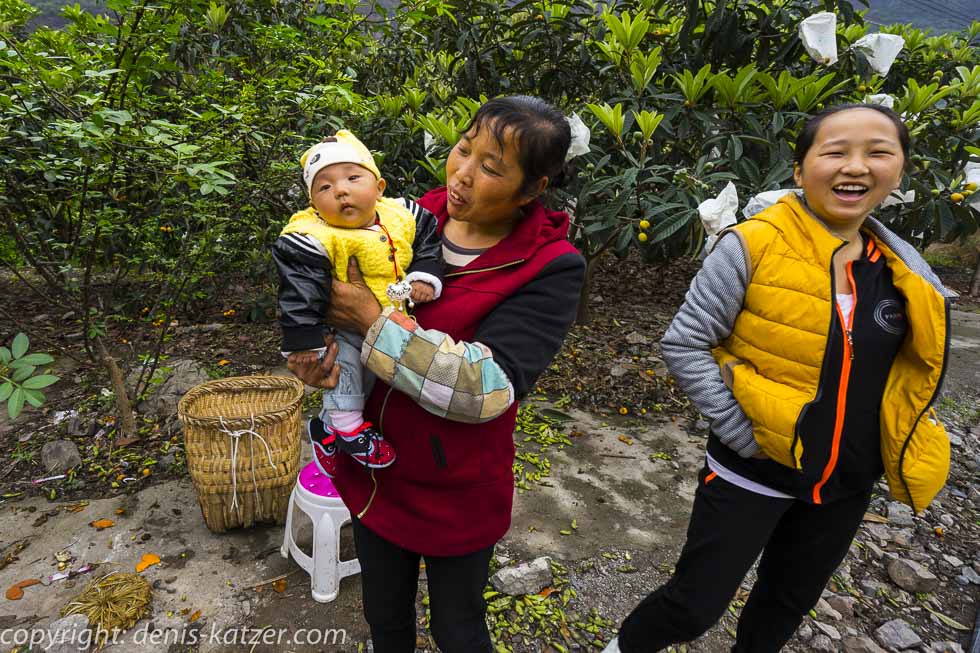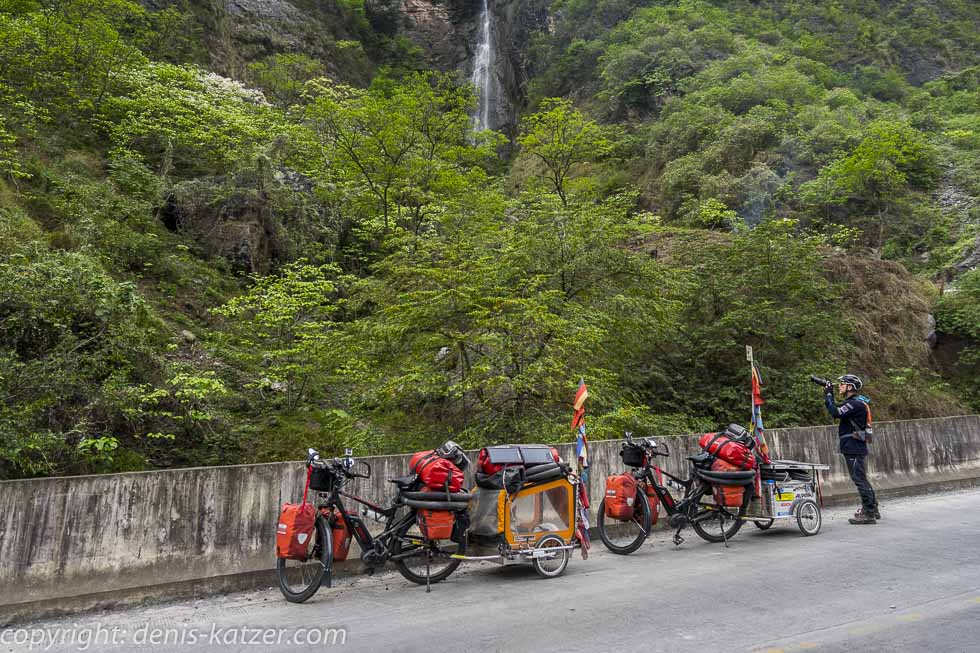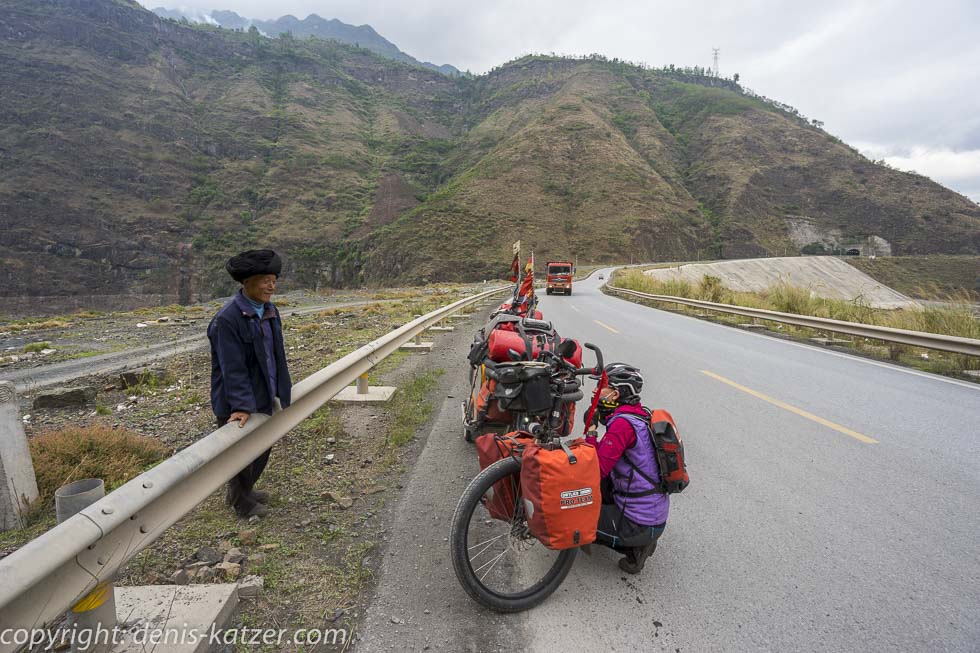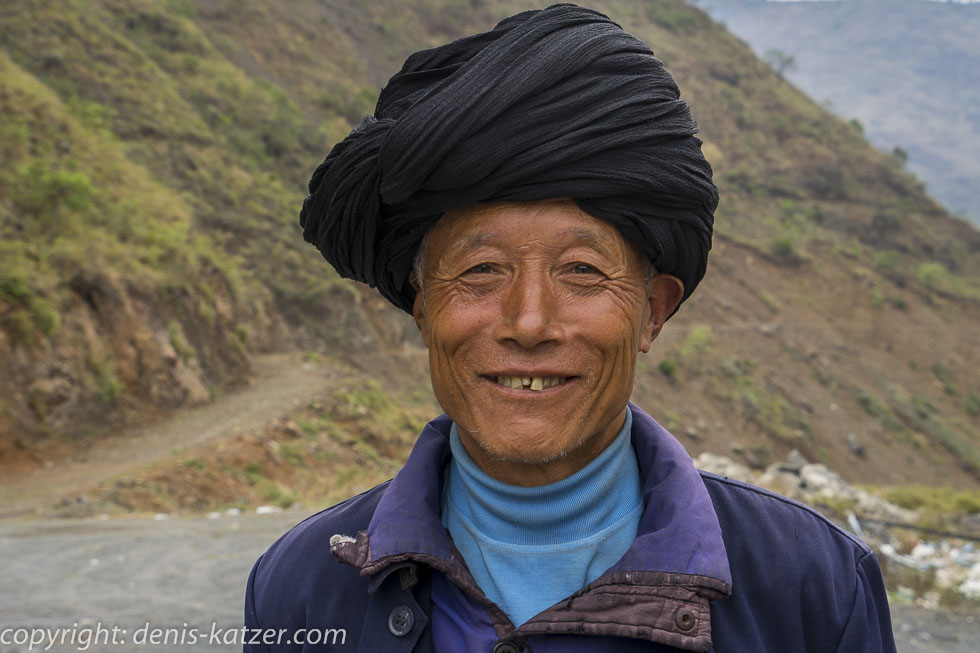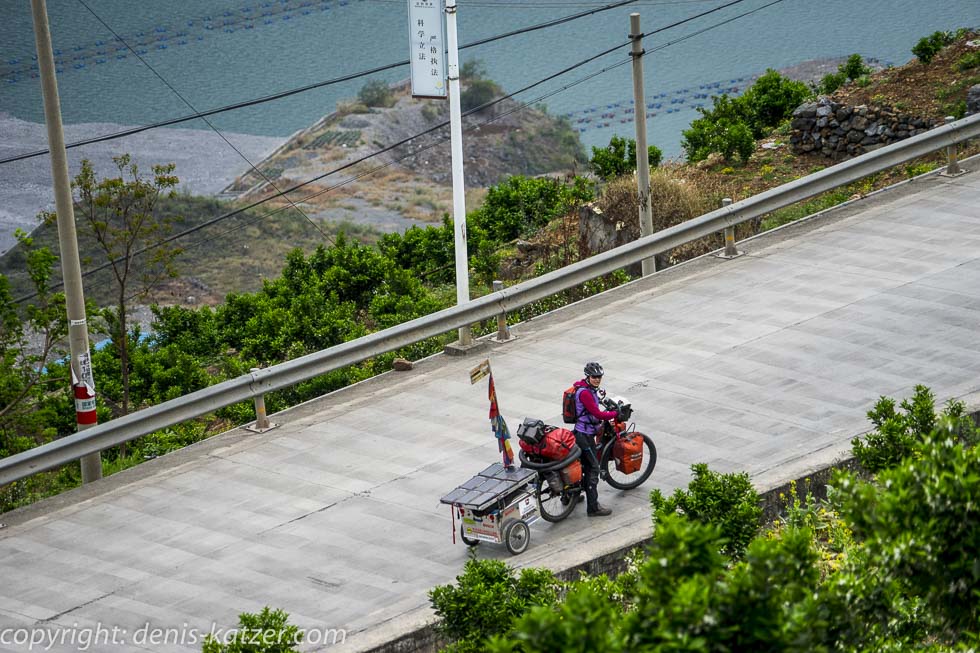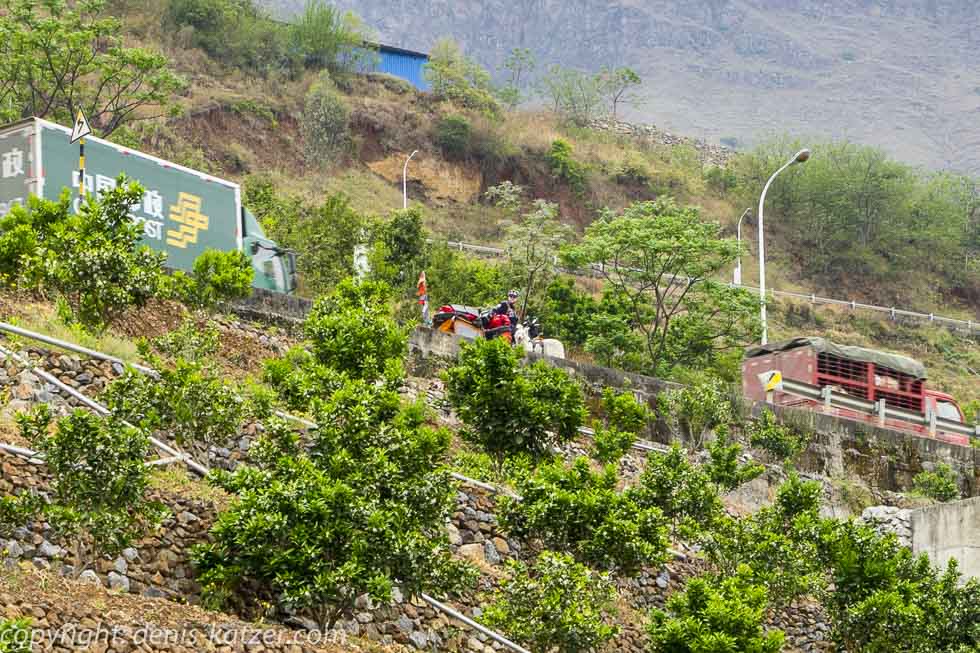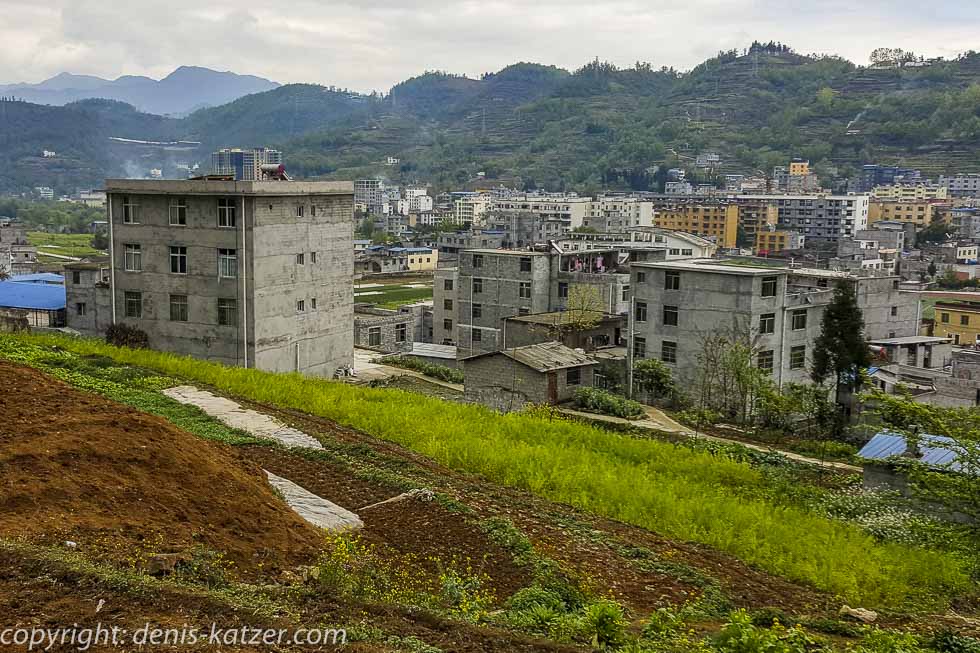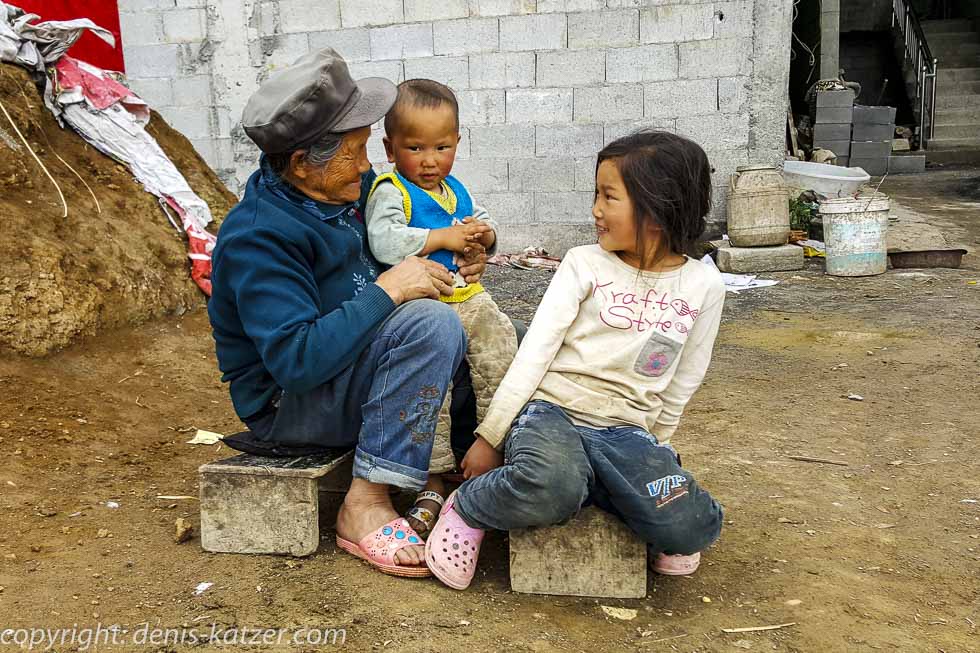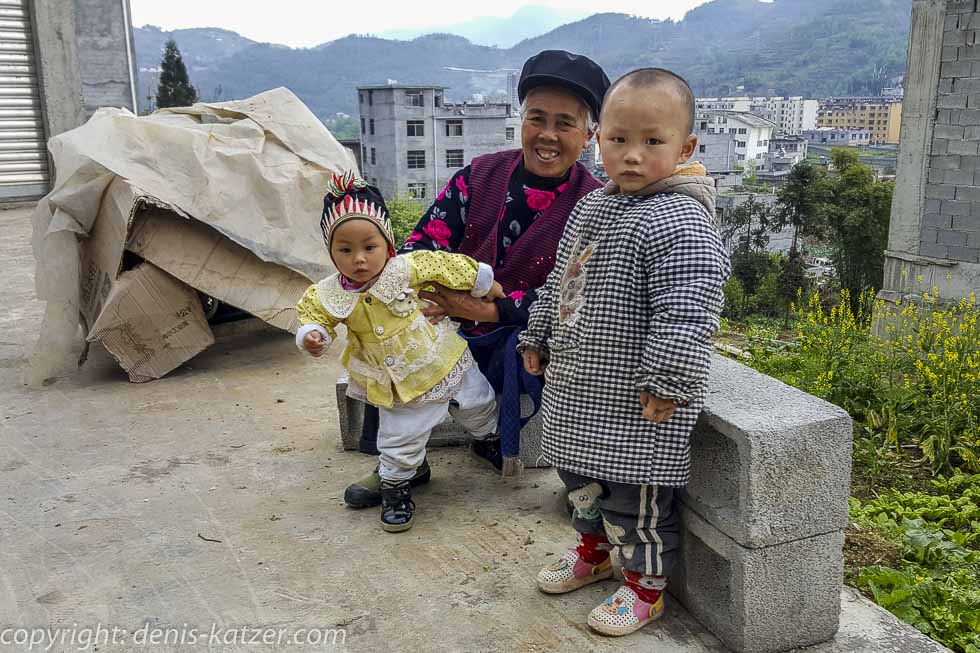
Sucked in by yawning black holes
N 28°16'13.3'' E 103°34'34.9''
Date:
09.04.2016 to 12.04.2016
Day: 286 289
Country:
China
Province:
Sichuan
Location:
Leibo
Latitude N:
28°16’13.3”
Longitude E:
103°34’34.9”
Daily kilometers:
89 km
Total kilometers:
16,517 km
As the crow flies:
50.70 km
Average speed:
17.5 km/h
Maximum speed:
54.2 km/h
Travel time:
5:01 hrs.
Soil condition:
Asphalt
Maximum height:
1.237 m
Total altitude meters:
30.604 m
Altitude meters for the day:
1.576 m
Sunrise:
06:47 a.m. – 06:44 a.m.
Sunset:
7:27 pm – 7:29 pm
Temperature day max:
22°C
Temperature day min:
14°C
Departure:
08:10 a.m.
Arrival time:
5:00 pm
(Photos of the diary entry can be found at the end of the text).
We didn’t get much sleep that night because of the noise from a karaoke bar in the basement of the building. Nevertheless, we get up at 6:00 am and are in the saddle at 08:10 am. At the edge of the village, that big black hole that tried to swallow us up last night yawns at us again. An ugly, grey cloud of exhaust gas billows out from inside the four-kilometer-long Yingzuiyan Tunnel No. 2 and disappears into the mountains. “We should put on our masks,” Tanja suggests. “Great idea,” I reply and slip one of the masks over my face that we wore in the smog-infested city of Xian. Because the lighting in the tube drilled into the rock has failed, we attach our warning lights to the trailer and, as always when it gets dark, switch on the powerful front lights. “Ready?” I ask Tanja. “Done,” she replies. A few meters later, we are swallowed up by the black. At a speed of 25 km/h, we hurtle over the bumpy, partly destroyed asphalt. The cone of light from my bike lamp dances through the tube, with cold mountain water dripping from the ceiling in some places. The narrow side strip is partially destroyed. “Watch out!”, I shout to warn Tanja not to drive up, when suddenly one of the damned and extremely dangerous speedbrakers appears in the distance. I brake hard to prevent my bike from thundering over it and possibly throwing me out of the saddle. My warning cry is thrown back by the rock faces and swallowed up by the yawning maw in front and behind us. After the pointless obstacle, I accelerate again. The whirring of the Bosch engine and the rolling tires purrs through the darkness. There is a low rumble in the distance. Slowly it gets louder. Then it starts to roar and builds up to a vicious roar. We cannot yet localize whether the evil beast will attack us from behind or in front. The atmosphere is eerie, even spooky. I look in the rear-view mirror. Tanja’s cone of light blinds me. The mountain breakthrough leads into a slight bend to the left. Behind it, I suspect the truck, which now sounds like a fire-breathing dragon. But it is also black behind the kink. The hot breath under the mask causes the lenses to fog up. I lift the glasses slightly with my right hand. This movement causes my bike to sway. A stone, which has obviously fallen from the ceiling, appears. I quickly drop my hand back onto the handlebars, make a turn and end up on the unpaved shoulder, which is perhaps 50 cm thin. I stumble, adrenaline shoots through my veins. A thought flashes through my brain. “Don’t fall off your bike here!” At the last second, I jerk the handlebars around and almost hit the angular rock with the trailer. “Phew. Lucky you.” Only a short time later, the roar of the evil beast becomes deafening. In fact, it comes from behind. The horrible shriek of an oversized truck horn almost blows us out of the saddle. Then the big, black tires of a stinking articulated lorry smack past us. It disappears a few hundred meters further behind the next arch. My breath now begins to blow the oxygen into the mask in bursts. It’s exhausting to cycle with a mask like that. Tanja must feel the same way, I think to myself. It’s crazy how long four kilometers can be. The tunnel that people have drilled into the mountain is never-ending. Glaring headlights dazzle us. Again, a whole herd of the terribly foul-smelling tin dragons comes galloping towards us. Suddenly, shadowy figures appear. They are road workers repairing the broken hard shoulder under inhumane conditions. Each of them tries to prolong their lives by wearing one of the cheap respirators. Ridiculous, because the fine dust is demonstrably not retained. Then, when the mean-spirited trucks roared past and the poor construction workers were eaten by the darkness in the rear-view mirror. it is quiet again. Only the hum of the endlessly working Bosch motor and the tires can be heard. My spit starts to taste bitter. The dust particles penetrate through the mask and the bandala, which we have also pulled over the mask. I am startled when my LED beam catches two poorly clad figures. They are standing on the crumbling shoulder underneath which rock water has seeped into the tunnel. Apparently they are farmers waiting to be taken away by someone. I will probably never get an answer to the question of why they do this in the exhaust-contaminated tube and not outside. Finally, a slight shimmer appears in the distance. “The exit,” it goes through my brain. Yes, the oval slowly gets bigger and bigger until it expands into a real light. The air is slowly getting better. Breathing becomes easier. And then we’re out. I throw my arms up in joy. Too early. Because of the sudden backlight, I overlook the speedbraker and crash over it at full speed. My cramped hands hold the handlebars. In a lightning reaction, I lift my butt to avoid getting hit in the soft parts by the saddle. The bike’s shock absorbers take most of the impact. Ajaci’s unsprung house on wheels flings up into the air, only to crash back down to the ground a fraction of a second later. Our dog takes it in his stride. Doesn’t make a sound, just wags its tail. He probably thought it was a voluntary stunt. We stop, tear the masks off our heads, get a breath of fresh air, switch off the warning lights and check whether my bike has been damaged. “All good,” I say, and we continue our journey. As soon as we round a bend, another black spot appears in the rock. We stop again to prepare ourselves for the interior of the mountain ahead. And so it goes for many kilometers. When we are released from one of the stinking tubes, we are greeted by an enormous mountain landscape with its deep gorges and crevasses. To our left, the Yangtze River flows lazily towards the Pacific Ocean. He is still unaware of the many more barrages he will have to overcome by then. Thick, dark clouds herald rain. Then one of the many black holes sucks us in again. Patiently and stoically, like an ox that spends its life running in circles to turn the millstone, we switch on the warning lights, put on our masks and accept the challenge as calmly as possible. In this way, we work our way through the Heijaping Tunnel, the Fengyan Tunnel, the Ma’anshi Tunnel, the Dayandong Tunnel, the Huangmaoba Tunnel and the Bayangping Tunnel, to name just the most important ones on today’s stage. There are a total of 18 tunnels, some of them dangerous, which enable us to make our way through the mountains on this day.
In addition to the blackness of the mountain interior, Mahu Lake is a welcome change for our eyes and minds. Small boats chug across its mirror-smooth surface. Traps are laid out and a dam prevents its water from pouring into a mountain gorge. Large concrete basins appear below a steep rock face. Stunned, we see anglers casting their lines into the artificial water. We later learn that Mahu Lake is now contaminated. This is probably the reason why the Chinese satisfy their fishing cravings in a concrete pool, even if they have to pay for every fish.
On the other side of the valley, the G213 winds its way southwest. “Look at that!” I shout, pull the brakes and can hardly believe what we’re seeing. A huge landslide has buried the entire mountain road over a length of perhaps a hundred meters. If anything was on the way at that time, it was crushed by the rubble and house-sized boulders. “Oh dear, it’s a good thing we’re on this side of the valley,” I say, looking stunned at the destruction. Knowing that we have once again been protected by guardian angels, we continue our exciting journey today. Waterfalls cascade down the mountain flank to our right, thundering and roaring into the valley. Ancient ruins, whose walls look like melted ice on a stick and have almost been eaten away by the ravages of time, press against the rock face.
Suddenly a heavy roadblock gets in our way. We slowly roll towards it. A man in uniform makes it unmistakably clear to us that we can go no further here. “We have to go to Leibo,” I say. “Bu”, (No) he replies as we make preparations to drive on. “You have to go back. You can’t go any further,” we understand and are horrified. “Oh no. I don’t fancy having to drive back through all those tunnels,” says Tanja. “We don’t have to. We can’t not get on here. The Chinese are all driving through too,” I try to calm our minds. However, the uniformed man remains unyielding. He keeps pointing to a sign that obviously says why we shouldn’t go through. My brain is running hot. There is no turning back for us. Even if we cycle back 100 kilometers to get to the other side of the valley, we can’t go any further because the road there is buried under an avalanche of rubble. The security guard keeps pointing to a police car parked on the side of the road 50 meters away. “Let’s ask the police,” I decide, and we roll our bikes over to the officers. “Ni hao”, they greet us in a friendly manner. We explain that we have to go to Leibo, which is why they ask us why we don’t go. “The gentleman there at the roadblock won’t let us pass,” we say. “Meiwenti”, (no problem) we understand with relief. One of the officers now accompanies us to the guard at the barrier and regulates the passage for us. A load off our minds. We set off without waiting long. Although the climb is steep, Tanja cycles as if she wanted to win first prize on a mountain stage of the Tour de France. Although I put my back into it, she doesn’t give me the slightest chance of catching up with her. “What are you racing at!” I shout after her. She pauses for a moment and replies; “You never know if they’ll change their minds down there!” There are armed soldiers at two other tunnels. The left tube seems to be accessible only for military or important people. The entrance to the mountain is protected by massive barbed wire and electricity. Everywhere the warning signs expressly point out not to touch the bare power cables under any circumstances.
As the crow flies, it is only 4 kilometers to our destination for the day, the small town of Leibo, but then the road winds its way upwards in brutal serpentines for about 15 kilometers. “Do we have to go up there?” asks Tanja, tilting her head back. “I think so,” I reply. After a short breather, we shift into first gear and kick our warhorses into high gear. I think of the ox turning the millstone again and keep my legs spinning. We have to work our way up from an altitude of 400 meters to 1,250 meters. The weight and the relentless incline drain our batteries. At an altitude of 800 meters I find the first straight spot where we can stop to swap the current collectors. Then it goes on. The rain-heavy, dark clouds hang in the mountain peaks towering in front of us. The first houses of the mountain village appear. People look at us in amazement and bewilderment. Some call out to us. Are we on a Tour de France stage after all? My thigh muscles are pumping blood through my veins and ache. Especially because we have already covered 85 strenuous kilometers today. The narrow streets of the village are very busy. There is honking, ringing and shouting. The road is still steeply uphill. Apart from the foundations of the houses, there do not seem to be any straight surfaces here. We ask for the hotel at a store. “Nali,” says the man, pointing further up. 10 minutes later we park in front of the modern box. Hengsheng Holiday Inn Hotel is written on the large sign. As is so often the case, at first you don’t want to know that our bikes are supposed to be inside the elegant-looking shed. While I keep an eye on our belongings outside and entertain the ever-growing crowd, Tanja turns on the charm. It only takes minutes as she comes outside with her thumbs up. “The receptionist is still having doubts, but I think we should just ride our bikes in,” she says. “Okay,” I reply, sending a quick prayer to the heavens, asking for this tactic to work well here too. As soon as we enter the hall with our dirty road trains, there is a huge clamor. “Don’t overestimate it,” is Tanja’s new standard saying. A woman is literally shouting at us and constantly pointing at Ajaci. Tanja shows her his reference book, in which she has written words of praise about him from some of the hotels on the entire trip so far. “Look,” says Tanja. “It says here that he is very, very sweet. He doesn’t bite, doesn’t bark, doesn’t shit in the room and doesn’t eat bed sheets or other furniture. You can stroke him too,” she asks the old teether, takes her hand and lets her stroke his fur. A Chinese man, the English teacher at the local university, introduces himself to us. “My name is Richard. May I help you?” he asks and takes over the translation. After the usual back and forth, Ajaci is accepted and our horses and trailers are now actually offered a safe place. “Don’t overestimate it,” I repeat Tanja’s words with a grin…
If you would like to find out more about our adventures, you can find our books under this link.
The live coverage is supported by the companies Gesat GmbH: www.gesat.com and roda computer GmbH http://roda-computer.com/ The satellite telephone Explorer 300 from Gesat and the rugged notebook Pegasus RP9 from Roda are the pillars of the transmission.
